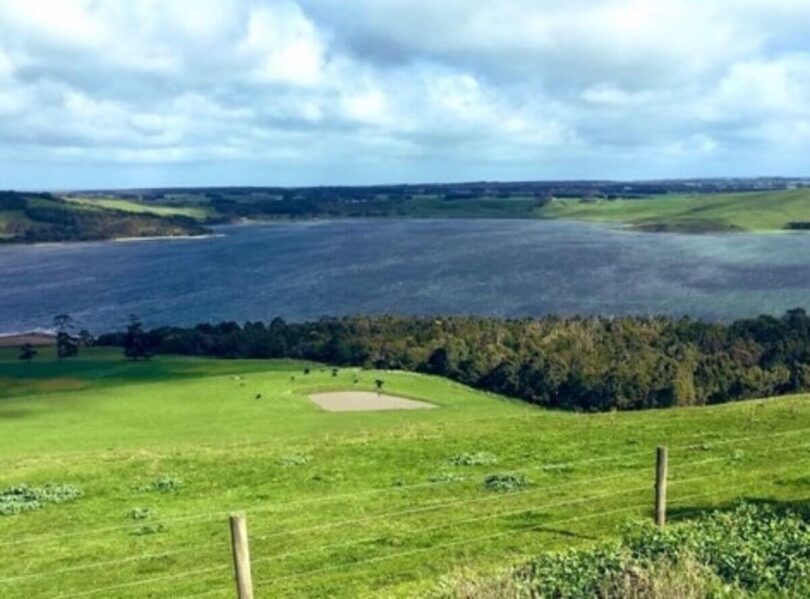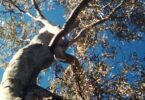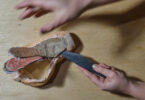PORTLAND, VICTORIA, AUSTRALIA
AUGUST 2004
Iam travelling through the Western District, bouncing in a corporate car over old volcanic plains, past shallow lakes in ancient craters, forever short of time.
I am travelling for work, sent by my employer to a series of appointments, four hours west of Melbourne.
By day I rush from thing to thing. At night I dine in country pubs, seated alone at a table for two, pushing fries around a plate.
I sleep in unforgiving beds, in cheap motels, adjacent to the main road, and wake to the noise in neighbouring rooms or to the glow of headlights splashed against my bedroom wall by cars in the motel courtyard.
I lie in the dark, beneath thin sheets, and trace the path of solitary trucks as they are drawn from the depths of a vast, black night to the cold, bright edge of town. They arrive in a clash of grinding gears and roll past my door like a low wave of thunder. They leave in their wake a monumental silence, when at last the air has settled.
I travelled this country when I was young, hitching my way from place to place, sleeping rough and running wild. Now I’m reading Leaves of Grass, the sprawling, epic poem by the celebrated American poet Walt Whitman.
Afoot and light-hearted, I take to the open road…
Henceforth I ask not good fortune, I am good fortune
Henceforth I whimper no more, postpone no more…
I am trying to recapture the way it felt to move at ease, unburdened by time, alive to the elements and the truth of my senses.
Stop this day and night with me
And you shall possess
The origin of all poems…
But I am lost and hesitant, and the magic of the open road has long since disappeared.
Towards the end of my week away, I visit a pub in Portland, in the southwest corner of the state. I wish to drink a pint of Guinness and read my Leaves of Grass.
There’s music playing as I enter the bar. Four musicians are seated at a table, beneath a large window in a small dark room. Winter sun pours through the heavy glass and is suspended at an angle in glistening beams of ghostly light.
I take my place in a snug, secluded corner and feel the room envelop me like an old, protective coat.
The music is a formless tune, a rolling stream of Celtic sounds. I have stumbled on an Irish ‘session’, an ancient form of musical expression in which musicians often play a song with no real beginning and no obvious end. Someone simply starts a tune, and those who know it are free to join. Maybe the session has a leader; more often, it has none.
Three men and a young woman are seated in a circle, attuned to one another like four cogs in a single wheel. They hold, between them, a tin whistle, two guitars and one violin.
They play a style of music that is measured, fine and fair. I am drawn at once to each of them and the melancholic feelings they so easily provoke. I drift in and out of memories with an aimless, fluid ease.
New musicians arrive at the bar. They sit to the side, tuning their instruments wordlessly. They wait for a pause in the rhythmic stream, or for one of the existing players to make a sympathetic exit, before they enter the flow and the circle re-forms, the same as before but different.
The only tune I recognise that entire afternoon is the much-loved Irish folksong, Inis Oírr. Time and again, the musicians weave their way back to its familiar notes of longing and loss, before they shift again and drift again to a new, evolving sound.
I have spent the week in a kind of pain, an existential longing for purpose and direction.
Oh me! Oh life! Of the questions of these recurring,
Of the endless trains of the faithless, of cities filled with the foolish…
What good amid these, O me, O life?
Now here I am, in a country town, in a pub of good spirit, in a song without end, in the company of people content to play their role, with the ghost of Walt Whitman hovering at my side.
That you are here – that life exists and identity –
That the powerful play goes on
And you may contribute a verse.
I feel a rush of energy. Green thoughts are shooting from my mind. If there are things I want to say, I’d better say them soon.
I drain my glass and prepare to leave. I move towards the exit and step out into the open air, taking with me, as I go, the fading notes of some sweet tune.
This article was first published on the remarkable Stereo Stories website, 19 February 2021.
Listen to a version of Inis Oírr that comes close to the version described above.
Featured image: Western District, Victoria (Paul Bateman).









Beautiful! thanks for sharing Paul. A story about a writer’s struggle and the relationship with the muse. I am also inspired to read the poem you were reading. I so relate to the feelings you had on the road, of 21century living (and working) drowning out the muse and leaving no space or energy for anything else. Your story sounds like a ‘how to’ for addressing writers block! I have similar rituals I need to exercise everytime i want to write, and to get me disconnected from the banal and unimportant yet all encompassing sometimes details of daily life – take a break from work, be in nature, lose yourself in rythyms such as the rain, the sounds of your feet walking, music, and reconnect with that part of yourself that gives you calm, purpose and joy! That’s when the stories start flowing. But your writing is evocative anyway, even when it is about a roadside motel!! 🙂 You have a gift for bringing the every day, 21st century australian city life to life…….it is really interesting and very entertaining/unique. I hope you are weaving this gift into something longer. An Italian glass across the miles, Bronte
Bronte, Thank you! I really appreciate this generous feedback. And I think you’re right to observe those rituals of yours – nature, walks, music, etc – I need them, too, and observe them, too. Collectively, they help balance the ship of self. There is a longer piece of art I’m working on, but it hasn’t been easy: to tell the right story and to make it sing; but I’m getting there. Thanks for the encouragement. All the best to you, in beautiful Rome! xx Paul